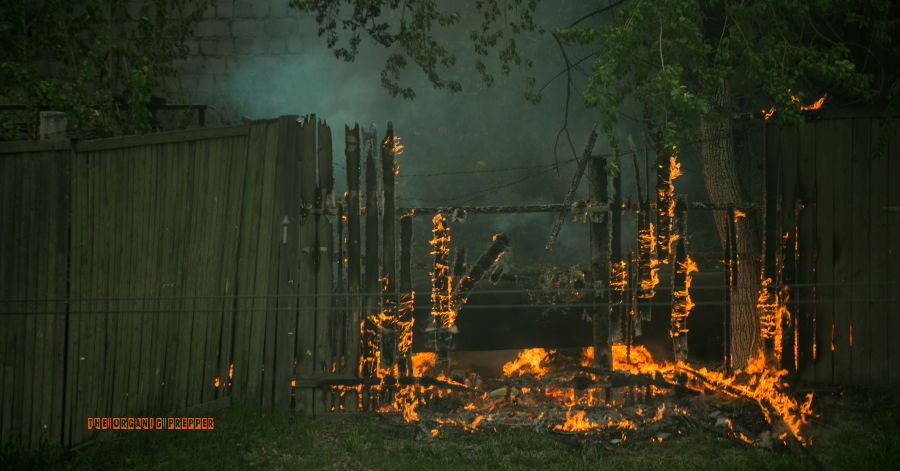by Aden Tate, The Organic Prepper:

I’m watching a lot of very bizarre disasters take place on American soil, and given that there are a number of actors in the world that absolutely hate America, I find it incredibly suspicious.
We’ve already seen the food facility fires that are going up in smoke all over the place. But when you add in all of the bizarre train derailments, chemical spills, and the like, the only conclusion I believe one can come to is that America is currently under attack. The problem is that most people mistakenly fall into the trap of thinking that unless tanks, Apaches, and bazookas are involved, it’s not war.
TRUTH LIVES on at https://sgtreport.tv/
This is a mistake.
The face of war has changed, and the more you understand 5th Generation Warfare and gray zone warfare, the better you’ll understand the happenings of today. In short:
Fifth-generation warfare (5GW) is warfare that is conducted primarily through non-kinetic military action, such as social engineering, misinformation, cyberattacks, along with emerging technologies such as artificial intelligence and fully autonomous systems. Fifth-generation warfare has been described by Daniel Abbot as a war of “information and perception.” (source)
and
The grey-zone is defined as “competitive interactions among and within state and non-state actors that fall between the traditional war and peace duality.” by the United States Special Operations Command.
A key element of operations within the grey-zone is that they remain below the threshold of an attack which could have a legitimate conventional military response (jus ad bellum).
One paper defined it as “coercive statecraft actions short of war”, and a “mainly non-military domain of human activity in which states use national resources to deliberately coerce other states”.
The Center for Strategic and International Studies defines the grey-zone as “the contested arena somewhere between routine statecraft and open warfare.”
British Defence Secretary Ben Wallace called the grey-zone “that limbo land between peace and war.” (source)
The book Unrestricted Warfare discusses these concepts.
It’s because of this that I would really want to tighten up my security if I owned one of the following types of facilities:
Steel production
Most certainly, the components involved with steel production (such as coke) would be at risk here. I go back and forth on whether actual steel furnaces would be at risk or not as well. For somebody to sabotage coke production wouldn’t be something that would cause the bulk of the American public to say, “Well, what’s going on here?!” for the simple reason that nobody knows anything about making steel anymore.
More people would be suspicious about a steel mill going down, but whoever is doing the sabotage also doesn’t really seem to care about public perception too much here. I think they think they could probably get away with this too.
Either way, this would impact the military, your ability to buy firearms, construction, vehicles, and more.
Medical supplies
I don’t think you would have to worry about pharmaceuticals (although we’re decidedly dealing with shortages) as much as actual supplies. So if there were factories out there responsible for manufacturing difficult-to-make medical components that were commonly needed and had short lifespans, that’s what I would be concerned about.
If it can be autoclaved (sterilized and reused), such as with surgical tools, don’t worry about it. But IV bags or other sterile gear that only certified companies can make? Quite frankly, I think they’re at risk of sabotage.
Blood supplies
I go back and forth a bit on this one as well.
Hospitals use a lot of blood, and though we’re seeing an increase in desire for unvaccinated blood, the fact of the matter is that a hospital isn’t concerned about the jabbed status of the blood at all. They see a guy bleeding out in the ER, and they just hook him up to blood supplies.
If there was a severe shortage of blood supplies at all, then there would be a lot of public unrest. I think this would result in massive blood drives throughout the country, but if the power at these main blood banks went out, there’s no denying that that would cause a lot of hardship, logistically speaking.
Tires
If there were issues getting tires, there would be issues for just about all aspects of American industry. All there would need to be is enough of an issue to cause prices here to rise significantly. Tires would still be available, but they would be so expensive that people would start to limit their driving or maybe even sell off a vehicle.
This would lead to less driving, which would suspiciously coincide with the “driving is bad for the planet” narrative.
Flour mills
I think that this would follow in the bizarre accidental fire suit. This would make it so we’d be more reliant on flour imports, there would be food shortages on American soil, the flour-based foods we did have would be more expensive (hurting Americans’ wallets and assisting to render them less financially resilient), and so on.
Read More @ TheOrganicPrepper.ca



